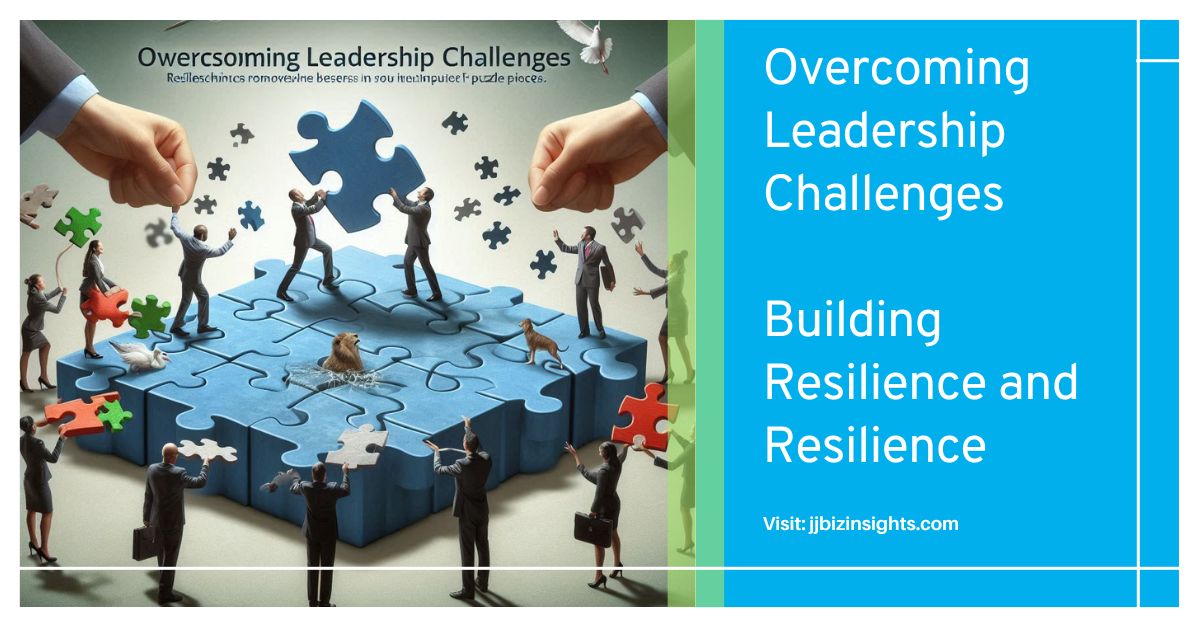
Overcoming Leadership Challenges: Building Resilience and Resilience
Leadership is not without its challenges. From building trust to managing time effectively, leaders face a myriad of obstacles that can hinder their effectiveness. By understanding these challenges and developing strategies to overcome them, leaders can enhance their resilience and become more effective in their roles.
Building Trust: The Foundation of Leadership

Trust is the cornerstone of effective leadership. It fosters open communication, collaboration, and loyalty among team members. To build trust, leaders must:
- Be Transparent: Share information openly and honestly, even when it’s difficult.
- Be Consistent: Demonstrate reliability and follow through on commitments.
- Be Empathetic: Show genuine care and concern for team members’ well-being.
- Be Vulnerable: Share personal and professional challenges to build rapport.
- Deliver Results: Consistently achieve goals and meet expectations to build credibility.
Managing Conflict: A Skill, Not a Weakness
Conflict is inevitable in any organization. How leaders handle disagreements can significantly impact team morale and productivity. Effective conflict management involves:
- Active Listening: Understanding all perspectives before responding.
- Open Communication: Creating a safe space for team members to express their opinions.
- Finding Common Ground: Identifying shared goals and interests.
- Reaching a Compromise: Finding solutions that meet the needs of all parties involved.
- Following Up: Ensuring that the agreed-upon solution is implemented and monitored.
The Art of Delegation: Empowering Your Team
Effective delegation is crucial for leadership success. It allows leaders to focus on strategic tasks while empowering team members to take ownership of their work.
- Clear Expectations: Define clear goals and outcomes for delegated tasks.
- Provide Support: Offer guidance and resources to help team members succeed.
- Trust and Autonomy: Give team members the freedom to make decisions and solve problems.
- Regular Check-ins: Monitor progress and provide feedback.
- Celebrate Successes: Recognize and reward team members for their accomplishments.
Time Management: Mastering the Art of Prioritization
Leaders often juggle multiple responsibilities and deadlines. Effective time management is essential for avoiding burnout and maximizing productivity.
- Prioritization: Focus on tasks that align with strategic goals.
- Time Blocking: Allocate specific time blocks for different activities.
- Delegation: Distribute tasks to free up time for important strategic work.
- Elimination: Learn to say no to non-essential tasks.
- Self-Care: Prioritize rest and relaxation to maintain focus and energy.
Balancing Work and Life: A Holistic Approach
A healthy work-life balance is essential for long-term leadership success. It prevents burnout, improves mental health, and enhances overall well-being.
- Setting Boundaries: Establish clear boundaries between work and personal life.
- Time Management: Effective time management is crucial for maintaining balance.
- Self-Care: Prioritize physical and mental health through activities like exercise, meditation, and hobbies.
- Support Network: Build a strong support system of family, friends, and colleagues.
- Flexibility: Embrace flexible work arrangements when possible.
By mastering these challenges, leaders can create a positive and productive work environment, build strong teams, and achieve organizational success.
Building Resilience
Resilience is the ability to bounce back from setbacks and adapt to challenging situations. Here are some ways to build resilience:
- Reflect and Assess: Understand your strengths and areas for improvement.
- Develop a Growth Mindset: Embrace challenges as opportunities to learn and grow.
- Practice Self-Care: Prioritize physical and mental health.
- Build a Support Network: Surround yourself with supportive colleagues, friends, and family.
- Learn from Failure: View failures as learning experiences and opportunities for growth123.
More about Building Resilience

Building resilience is crucial for leaders to navigate challenges and maintain effectiveness. Here are some key strategies to enhance resilience:
1. Develop a Growth Mindset
- Embrace Challenges: View obstacles as opportunities to learn and grow.
- Learn from Failure: Treat setbacks as valuable learning experiences.
- Stay Positive: Focus on what you can control and maintain a positive outlook.
2. Practice Self-Care
- Physical Health: Engage in regular exercise, maintain a balanced diet, and get adequate sleep.
- Mental Health: Practice mindfulness, meditation, or other stress-relief techniques.
- Hobbies and Interests: Make time for activities you enjoy outside of work.
3. Build a Support Network
- Professional Support: Seek mentorship and build relationships with colleagues who can offer guidance and support.
- Personal Support: Lean on family and friends for emotional support.
- Community Involvement: Engage in community activities to build a broader support network.
4. Enhance Emotional Intelligence
- Self-Awareness: Understand your emotions and how they affect your behavior.
- Self-Regulation: Manage your emotions in healthy ways.
- Empathy: Understand and share the feelings of others.
- Social Skills: Build strong relationships and communicate effectively.
5. Set Realistic Goals
- Short-Term Goals: Break down larger objectives into manageable tasks.
- Long-Term Vision: Keep sight of your overall mission and purpose.
- Celebrate Milestones: Acknowledge and reward progress along the way.
6. Stay Adaptable
- Flexibility: Be open to change and willing to adjust your plans as needed.
- Problem-Solving Skills: Develop creative solutions to overcome obstacles.
- Continuous Learning: Stay curious and seek out new knowledge and skills.
7. Reflect and Assess
- Regular Reflection: Take time to reflect on your experiences and what you’ve learned.
- Feedback: Seek constructive feedback from others to improve.
- Self-Assessment: Regularly evaluate your strengths and areas for growth.
8. Maintain Work-Life Balance
- Boundaries: Set clear boundaries between work and personal life.
- Time Management: Prioritize tasks and manage your time effectively.
- Relaxation: Ensure you have time to relax and recharge.
9. Cultivate Optimism
- Positive Thinking: Focus on positive outcomes and possibilities.
- Gratitude: Practice gratitude by acknowledging the good things in your life.
- Resilience Narratives: Remind yourself of past successes and how you overcame challenges.
By incorporating these strategies, leaders can build resilience, better handle stress, and maintain their effectiveness in the face of adversity. Is there a specific area of resilience you’d like to explore further or any particular challenge you’re facing?
Cultivating Powerful Leadership: A Comprehensive Guide





